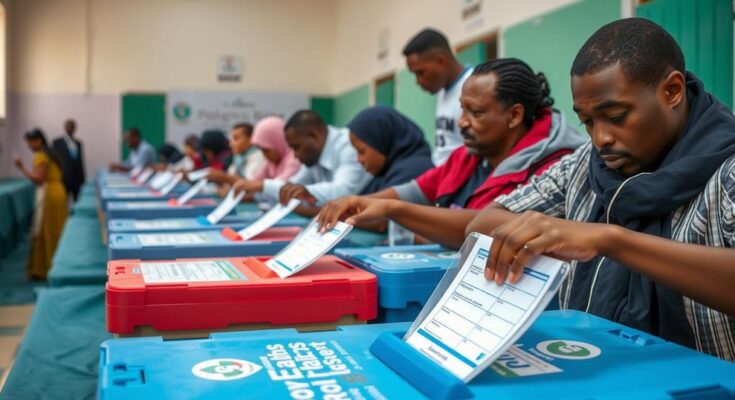Voters in Comoros are electing a 33-seat parliament amid allegations of irregularities from the previous elections. Approximately 338,000 people are registered to vote, and nearly 100 candidates are vying for seats. Critics accuse President Assoumani of authoritarianism and suspect him of planning to position his son for succession. Some opposition leaders have called for a boycott, while others reject this plea. Results are expected by Friday.
Voters in the Comoros archipelago are participating in parliamentary elections to fill the nation’s 33-seat assembly, following the controversial re-election of President Azali Assoumani last year. The ruling party has faced accusations of electoral malpractice, which officials have denied. The polls opened early on Sunday, with approximately 338,000 registered voters. The country has not held parliamentary elections since January 2020, and nearly 100 candidates have been sanctioned by the Supreme Court to contend in this election.
Assoumani’s rule, which commenced through a coup in 1999, has been marked by claims of authoritarianism, particularly as critics speculate he aims to position his eldest son, Nour El-Fath, for succession after his term expires in 2029. In a notable development, in 2024, Assoumani granted his son extensive powers to oversee government operations. Some opposition factions, including Juwa, led by the imprisoned former president Ahmed Abdallah Sambi, have advocated for an election boycott; however, a faction has dismissed this call. Hamidou Karihila, an opposition candidate representing Hope of the Comoros, articulated that participating in these elections would unmask flaws within the regime and hasten its decline. Election results are anticipated by Friday.
The Comoros, located in the Indian Ocean, has a tumultuous political history characterized by coups and political strife. President Azali Assoumani, in power since a coup in 1999 and having won three subsequent elections, faces scrutiny regarding his governance, characterized by accusations of authoritarianism. The last parliamentary elections occurred in January 2020, and the upcoming elections represent a critical juncture for the nation as opposition parties grapple with the regime’s trustworthiness and legitimacy while some leaders call for a boycott amid allegations of electoral misconduct. The dynamics of political power and potential dynastic succession have further complicated the political landscape in Comoros, making this election particularly significant for the locals.
The parliamentary elections in Comoros serve as a pivotal moment in the nation’s political landscape, amid allegations of electoral irregularities and concerns regarding the potential succession of President Assoumani’s son. With a contingent of opposition parties showing willingness to engage in the election process despite calls for a boycott, the results expected by Friday will likely reflect public sentiment regarding Assoumani’s long-standing rule. The outcome of this election may either legitimize the current regime or catalyze demands for political reform in the archipelago.
Original Source: www.lismorecitynews.com.au




